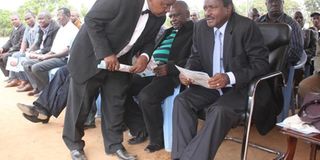Kalonzo Musyoka wants Wiper MPs to be more vocal

Wiper Democratic Movement leader Kalonzo Musyoka (right) speaks to Temi Mutia during the burial of Mzee Mutia Ndonyi. PHOTO | COURTESY
What you need to know:
- Party leader wants the legislators to make more contributions in the House.
Wiper Democratic Movement leader Kalonzo Musyoka on Saturday asked his party MPs to be more vocal in the National Assembly on matters affecting their constituents.
Mr Musyoka noted that two years since the General Election, some MPs were yet to make significant contributions on the floor of the House, despite the numerous insecurity and development challenges affecting their constituents.
The former vice president made the remarks during the burial of Mzee Mutia Ndonyi, the father of a Cord coalition advisor, Dr Temi Mutia.
He told MPs who were present, including Nyiva Mwendwa (Women rep), Bernard Kitungi (Mwingi West), Makali Mulu (Kitui Central), that they should be more active in the House.
“Your first duty in Parliament is to represent your people and make good laws for the country but unfortunately, we don’t get to hear you articulating the concerns of the electorate at the National Assembly,” he said.
He warned them that parliamentary proceedings including some committee sessions were televised and Kenyans are able to see the kind contributions they make and how often they make them.
“Nyiva should actually use her seniority and experience in parliamentary service to provide guidance to the new MPs because your age commands respect amongst the members,” he said.
Mr Musyoka said he expected the MPs to table compelling motions regarding the insecurity and bandit attacks in Kitui County, insisting residents want to see them deliberate their problems on the floor.
Contacted for comment, the MPs said they took the remarks from their party boss positively and they would improve their performance.
Speaking to Nation separately on telephone, Mr Makali and Mr Kitungi promised to be at forefront defending the party and coalition as much as they deal with local issues.
"As leaders, we must accept to be corrected and we take that challenge positively" said Mr Makali, adding he would rally his colleagues to improve as well.
Efforts to contact Mrs Mwendwa were fruitless as telephone calls to her number went unanswered.




